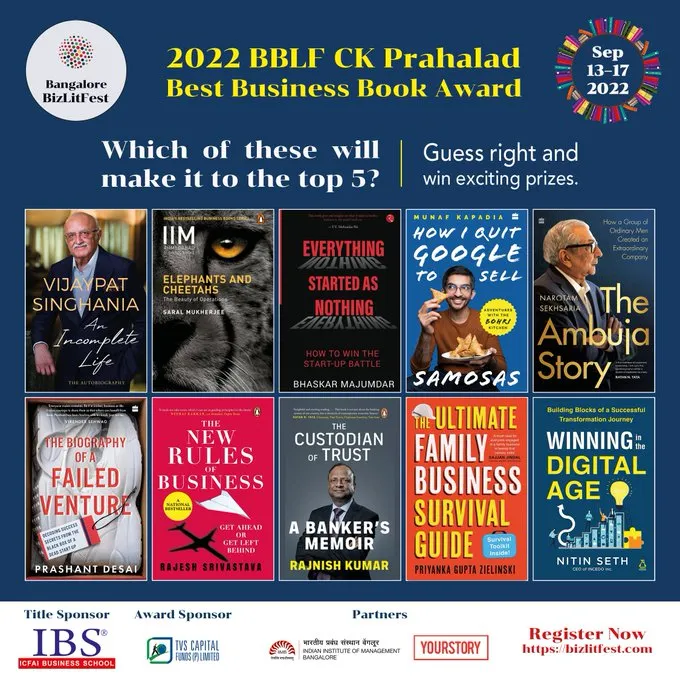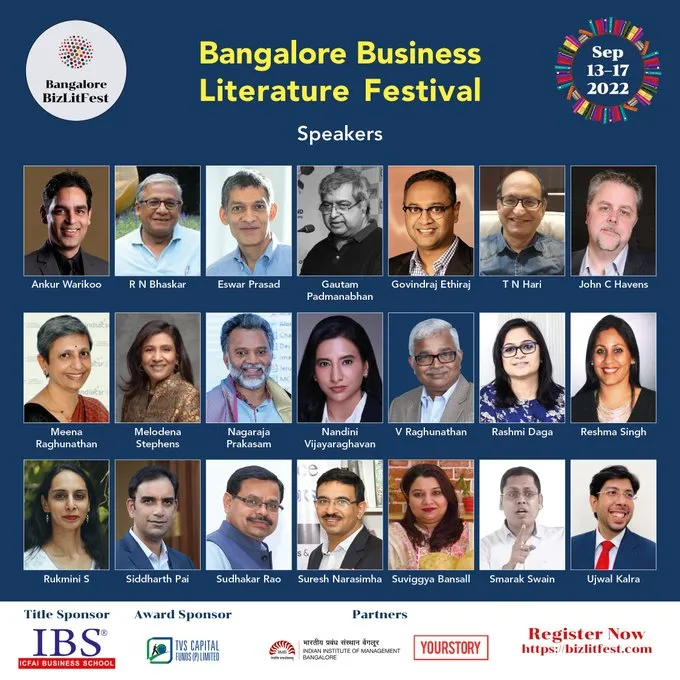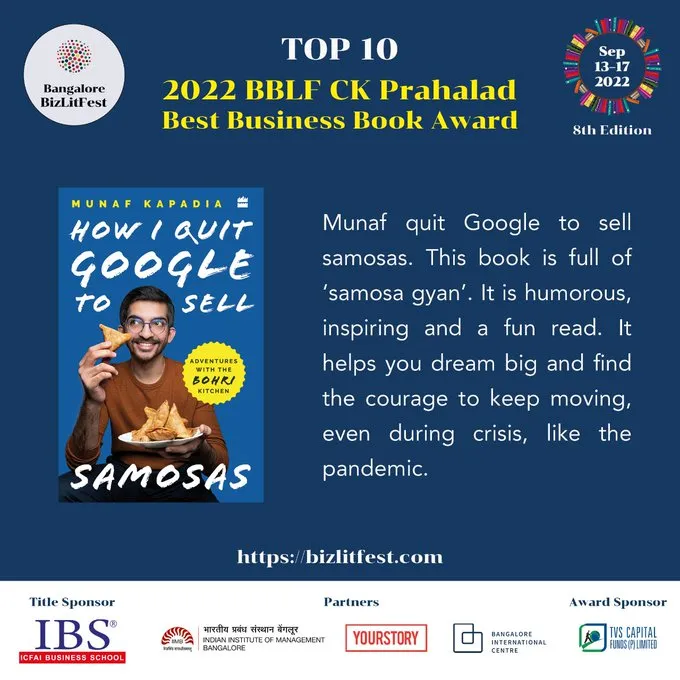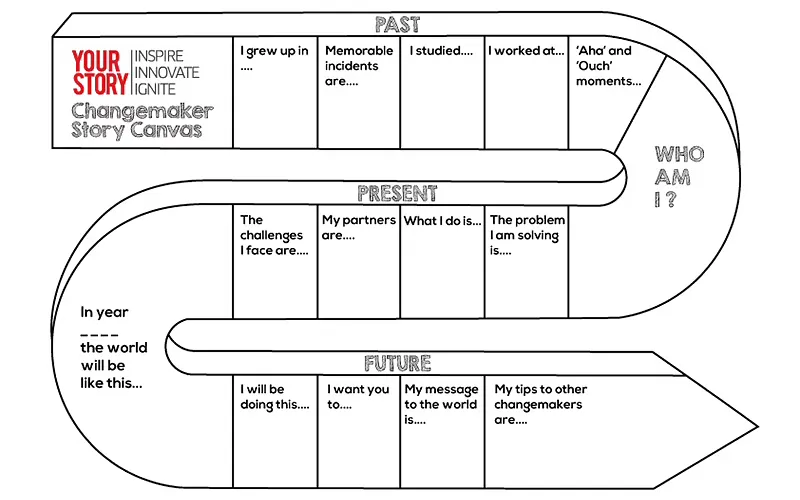Resilience, ecosystems, coaching – Bangalore Business LitFest speakers share tips for startup founders
Ankur Warikoo, TN Hari, and Nagaraja Prakasam are speaking at the upcoming BBLF 2022. Our second preview article collates entrepreneur tips from these experts.
YourStory is the media partner for the upcoming Bangalore Business Literature Festival (BBLF) 2022, to be held on September 13-17. See our earlier annual articles on BBLF from the 2015 edition onwards here, and our compilation of 85 Quotes on World Book Day.
See also YourStory’s Book Review section with takeaways from over 340 titles on creativity, entrepreneurship, innovation, social enterprise, and digital transformation.
In our second preview article on BBLF 2022, we share founder tips from entrepreneur-author Ankur Warikoo, angel investor and fund advisor Nagaraja Prakasam, and investor-author-mentor TN Hari.

Coaching and mentorship
To win over founders for being their mentors and coaches, Ankur advises sharing of journeys. “If they relate to it, they will automatically be drawn towards you. Create a personal brand where you share your story. Twitter and LinkedIn are great platforms for that,” he says.
“Usually founders from early to growth stage are the most open to advice and also draw the most benefit from timely and relevant advice,” Ankur says.
“For mentoring you need empathy and ability to provide unbiased feedback. There is a confusion in the space and people are calling everything mentoring – teaching, coaching, consulting, expert advising, and domain knowledge inputs,” Nagaraja says.
“I've seen startups grown to 400 employees still calling me. So coaching and mentorship apply at all stages, not just one. It's lonely at the top, and wherever you are in your journey it's good to have someone who can provide unbiased feedback,” he affirms.
“Founders are extremely smart people, and busy people too. They will engage only if they believe you can add value and simplify their lives. They are open at every stage, provided they believe you have answers to the questions and problems they are grappling with at that stage,” TN Hari explains.
“Mentors and advisors have a reputation that precedes them and founders should seek out those about whom they hear from other founders in their networks,” Hari adds.

Pandemic resilience and startups
The pandemic posed severe challenges to most businesses, though the agile and fortunate ones were able to innovate out of the crisis or even spot opportunities.
“The pandemic made every human being humble against nature and made us relook at life priorities. That applied to startups as well,” Nagaraja recalls.
He describes a spectrum of startup responses during the pandemic: repurpose and grab the opportunity; pivot to survive; survive for a better day; or shut down.
“I was glad to see more startups repurposing or pivoting. Most of my portfolio thrived, like telemedicine, farm to home, waste management, waste to energy, and reclaimed water. This also applied to handloom, as fast fashion gave way to slow fashion,” Nagaraja adds.

Startup ecosystem
All three speakers are actively involved in India’s startup ecosystem, and are widely respected influencers, speakers, and sounding boards for founders.
“I see impact investors co-investing with mainstream investors, as the mainstream comes down to the next 500 million citizens and impact investors go above. So the bottom 250 million is vacant for real impact investors to grab using widely-accepted SDG goals,” Nagaraja says.
TN Hari has co-founded the Artha School of Entrepreneurship to accelerate journeys of entrepreneurs in scaling their ventures. The mission is also to help founders and contribute to the social and economic prosperity of their communities.
“The vision is to be the world's leading institution helping founders build large and sustainable businesses. The curriculum will be practical and based on a rich collection of real-life experiences,” Hari says.
The faculty will comprise founders and operators who have built and scaled companies. “We are a not-for-profit company by choice. Creating deep impact across the entire spectrum of entrepreneurship is of paramount importance,” he says.

Profitability and social impact
Over the years, a number of debates have sprung up in the entrepreneurship space on the tradeoffs between value or valuation, growth or profitability, business or social impact.
“With ESG (environment, social, governance) issues being the most talked about now in corporate circles, I am very optimistic that the whole world is realising what is important,” Nagaraja says.
This was very different seven years ago when Nagaraja invested in Solaron, a provider of ESG ratings and research.
“Today's startup is tomorrow’s corporate, and if they don't fix themselves now they will need to later. So it's better to build the triple bottom line thought now itself,” he emphasises.

Founder advice
The speakers also offer tips for aspiring founders, on problem finding and perseverance.
This year, Damodaran, Founder of Gramalaya, received the Padma Shri award for his relentless work on toilets for 35 years. “Gramalaya is in my portfolio. Now, as the government has taken up Swachh Bharat, he picked up another problem to solve. That much of perseverance is required to see a real difference,” Nagaraja advises.
“Entrepreneurship is not a cool thing as is made out in media stories of the rich and famous entrepreneurs. Mostly, it consists of hard work and setbacks, and needs tons of resilience,” Hari cautions.
“So, start up only if you feel the need to solve a problem deep in your soul and have the strength to rough it out,” Hari signs off.
Edited by Teja Lele



![[Year in Review 2021] Meet the top 10 techies we celebrated this year](https://images.yourstory.com/cs/2/b87effd06a6611e9ad333f8a4777438f/collage4-1639196680900.png?fm=png&auto=format&h=100&w=100&crop=entropy&fit=crop)
![[Year in Review 2021] Amid COVID-19, these 10 non-profits created social impact this year](https://images.yourstory.com/cs/5/79900dd0d91311e8a16045a90309d734/collage-1640102486726.png?fm=png&auto=format&h=100&w=100&crop=entropy&fit=crop)
![[Year in Review] Meet these Indian women who used social media to drive change and social impact](https://images.yourstory.com/cs/4/211ccaf00e6d11e997fe8f165dce9bb1/NewDesigncopy14-1640700625660.png?fm=png&auto=format&h=100&w=100&crop=entropy&fit=crop)




